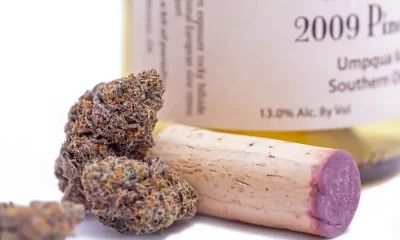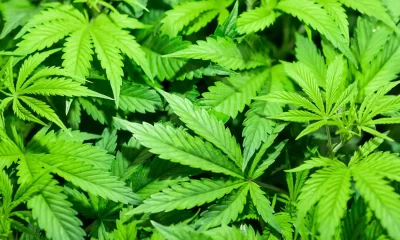Business
Indian Cafe in Pune Serves Hemp-Infused Food

India is moving into the hemp space—as a new eatery serving infused food in Pune demonstrates. The establishment serves sandwiches, coffee, and other foods infused with hemp. The 30 year owner of the Hemp Cafe, Amruta Shitole, is actually a serial cannabis entrepreneur, having opened the Ganja Cafe previous to this, and has been successfully selling cannabis infused food products for the last four years.
She is not the only ganjapreneur in the country of course. There have been numerous projects—and products—launched recently. One that caught the recent eye of the foreign and travel press? A new gin produced in Goa called Satiwa which calls itself a “happy high gin” because it is also infused with hemp.
But this is just the tip of the iceberg.
What Is the State of Cannabis Reform in India?
Cannabis has been used in India for thousands of years. It has also traditionally been utilized in many different forms—from resin (called charas) to ganja (flower) and bhang (the seeds and leaves). The use of cannabis is mentioned in texts which date back to 1000 CE.
In 2019, a study conducted by the All India Institutes of Medical Sciences—an autonomous group of government public medical universities under the jurisdiction of the Ministry of Health and Family Welfare—reported that about 7.2% of Indians used cannabis in the last year. In a country of 1.38 billion people this is not incredibly significant when it comes to the percentage of the population who are cannabis users. In real terms, however, this represents as many as 99 million people—or about one third of the total population of the United States.
According to the UNODC, the retail price of cannabis was lower than anywhere else in the world—about $0.10 per gram. New Delhi and Mumbai clocked in as the third and sixth highest cannabis consuming cities in the world in 2018. As of 2022, heroin and high THC cannabis are the two most used “illicit” drugs in the country. Both illegal cultivation networks and seizures are up too, which is why authorities are turning to drones for interdiction, particularly in parts of the country that are remote and hard to access by other means.
The Sleeping Cannabis Giant
While the trade and consumption of all high THC cannabis is still illegal here per the Narcotic Drugs and Psychotropic Substances Act of 1985, there have been increasing calls for its legalization. In the meantime, intriguing projects are afoot across the country. Much like the U.S., individual Indian states have wide leeway to formulate their own laws about the cultivation, warehousing, processing, and interstate transport of the drug.
It is clear that there is huge interest in cannabis—both as a domestic product and as an export. Indian pharmaceutical firm Dr. Reddy’s actually bought a German narcotics distributor in Frankfurt in February of this year.
On the recreational side of the discussion, Mallana Cream, cultivated in a small Himalayan village to which the strain owes its name, is one of the most expensive cannabis strains in the world. Connoisseurs trek here to sample it from around the world.
As legalization comes, expect India’s most famous strain to become a highly sought, legally exported product.
In the meantime, the industry is growing here, particularly on the hemp side of the discussion. The Indian Hemp Expo, the first B2B exhibition of its kind in the country, kicked off in mid-May this year in Delhi. It was heavily attended by a wide range of firms and individuals across the burgeoning industry domestically and internationally.
India Vs. China—The New Hemp Capitals of The World?
How the industry develops here, particularly in relation to its Asian neighbor China, will be interesting to watch. At present, two Chinese provinces account for over two thirds of global hemp fiber production—and cultivation has dramatically increased year over year for the past 7 years.
However, it appears, at least so far, that China will focus more on textiles and biocomposites than edibles. For that reason, India is certainly strategically well-positioned to enter the global hemp industry across a range of products.
Of course, it won’t just end there. It never has.
Source: https://hightimes.com/news/indian-cafe-in-pune-serves-legal-hemp-infused-food/
Business
New Mexico cannabis operator fined, loses license for alleged BioTrack fraud

New Mexico regulators fined a cannabis operator nearly $300,000 and revoked its license after the company allegedly created fake reports in the state’s traceability software.
The New Mexico Cannabis Control Division (CCD) accused marijuana manufacturer and retailer Golden Roots of 11 violations, according to Albuquerque Business First.
Golden Roots operates the The Cannabis Revolution Dispensary.
The majority of the violations are related to the Albuquerque company’s improper use of BioTrack, which has been New Mexico’s track-and-trace vendor since 2015.
The CCD alleges Golden Roots reported marijuana production only two months after it had received its vertically integrated license, according to Albuquerque Business First.
Because cannabis takes longer than two months to be cultivated, the CCD was suspicious of the report.
After inspecting the company’s premises, the CCD alleged Golden Roots reported cultivation, transportation and sales in BioTrack but wasn’t able to provide officers who inspected the site evidence that the operator was cultivating cannabis.
In April, the CCD revoked Golden Roots’ license and issued a $10,000 fine, according to the news outlet.
The company requested a hearing, which the regulator scheduled for Sept. 1.
At the hearing, the CCD testified that the company’s dried-cannabis weights in BioTrack were suspicious because they didn’t seem to accurately reflect how much weight marijuana loses as it dries.
Company employees also poorly accounted for why they were making adjustments in the system of up to 24 pounds of cannabis, making comments such as “bad” or “mistake” in the software, Albuquerque Business First reported.
Golden Roots was fined $298,972.05 – the amount regulators allege the company made selling products that weren’t properly accounted for in BioTrack.
The CCD has been cracking down on cannabis operators accused of selling products procured from out-of-state or not grown legally:
- Regulators alleged in August that Albuquerque dispensary Sawmill Sweet Leaf sold out-of-state products and didn’t have a license for extraction.
- Paradise Exotics Distro lost its license in July after regulators alleged the company sold products made in California.
Golden Roots was the first alleged rulebreaker in New Mexico to be asked to pay a large fine.
Source: https://mjbizdaily.com/new-mexico-cannabis-operator-fined-loses-license-for-alleged-biotrack-fraud/
Business
Marijuana companies suing US attorney general in federal prohibition challenge

Four marijuana companies, including a multistate operator, have filed a lawsuit against U.S. Attorney General Merrick Garland in which they allege the federal MJ prohibition under the Controlled Substances Act is no longer constitutional.
According to the complaint, filed Thursday in U.S. District Court in Massachusetts, retailer Canna Provisions, Treevit delivery service CEO Gyasi Sellers, cultivator Wiseacre Farm and MSO Verano Holdings Corp. are all harmed by “the federal government’s unconstitutional ban on cultivating, manufacturing, distributing, or possessing intrastate marijuana.”
Verano is headquartered in Chicago but has operations in Massachusetts; the other three operators are based in Massachusetts.
The lawsuit seeks a ruling that the “Controlled Substances Act is unconstitutional as applied to the intrastate cultivation, manufacture, possession, and distribution of marijuana pursuant to state law.”
The companies want the case to go before the U.S. Supreme Court.
They hired prominent law firm Boies Schiller Flexner to represent them.
The New York-based firm’s principal is David Boies, whose former clients include Microsoft, former presidential candidate Al Gore and Elizabeth Holmes’ disgraced startup Theranos.
Similar challenges to the federal Controlled Substances Act (CSA) have failed.
One such challenge led to a landmark Supreme Court decision in 2005.
In Gonzalez vs. Raich, the highest court in the United States ruled in a 6-3 decision that the commerce clause of the U.S. Constitution gave Congress the power to outlaw marijuana federally, even though state laws allow the cultivation and sale of cannabis.
In the 18 years since that ruling, 23 states and the District of Columbia have legalized adult-use marijuana and the federal government has allowed a multibillion-dollar cannabis industry to thrive.
Since both Congress and the U.S. Department of Justice, currently headed by Garland, have declined to intervene in state-licensed marijuana markets, the key facts that led to the Supreme Court’s 2005 ruling “no longer apply,” Boies said in a statement Thursday.
“The Supreme Court has since made clear that the federal government lacks the authority to regulate purely intrastate commerce,” Boies said.
“Moreover, the facts on which those precedents are based are no longer true.”
Verano President Darren Weiss said in a statement the company is “prepared to bring this case all the way to the Supreme Court in order to align federal law with how Congress has acted for years.”
While the Biden administration’s push to reschedule marijuana would help solve marijuana operators’ federal tax woes, neither rescheduling nor modest Congressional reforms such as the SAFER Banking Act “solve the fundamental issue,” Weiss added.
“The application of the CSA to lawful state-run cannabis business is an unconstitutional overreach on state sovereignty that has led to decades of harm, failed businesses, lost jobs, and unsafe working conditions.”
Business
Alabama to make another attempt Dec. 1 to award medical cannabis licenses

Alabama regulators are targeting Dec. 1 to award the first batch of medical cannabis business licenses after the agency’s first two attempts were scrapped because of scoring errors and litigation.
The first licenses will be awarded to individual cultivators, delivery providers, processors, dispensaries and state testing labs, according to the Alabama Medical Cannabis Commission (AMCC).
Then, on Dec. 12, the AMCC will award licenses for vertically integrated operations, a designation set primarily for multistate operators.
Licenses are expected to be handed out 28 days after they have been awarded, so MMJ production could begin in early January, according to the Alabama Daily News.
That means MMJ products could be available for patients around early March, an AMCC spokesperson told the media outlet.
Regulators initially awarded 21 business licenses in June, only to void them after applicants alleged inconsistencies with how the applications were scored.
Then, in August, the state awarded 24 different licenses – 19 went to June recipients – only to reverse themselves again and scratch those licenses after spurned applicants filed lawsuits.
A state judge dismissed a lawsuit filed by Chicago-based MSO Verano Holdings Corp., but another lawsuit is pending.
Source: https://mjbizdaily.com/alabama-plans-to-award-medical-cannabis-licenses-dec-1/
-

 Business2 years ago
Business2 years agoPot Odor Does Not Justify Probable Cause for Vehicle Searches, Minnesota Court Affirms
-

 Business2 years ago
Business2 years agoNew Mexico cannabis operator fined, loses license for alleged BioTrack fraud
-

 Business2 years ago
Business2 years agoAlabama to make another attempt Dec. 1 to award medical cannabis licenses
-

 Business2 years ago
Business2 years agoWashington State Pays Out $9.4 Million in Refunds Relating to Drug Convictions
-

 Business2 years ago
Business2 years agoMarijuana companies suing US attorney general in federal prohibition challenge
-

 Business2 years ago
Business2 years agoLegal Marijuana Handed A Nothing Burger From NY State
-

 Business2 years ago
Business2 years agoCan Cannabis Help Seasonal Depression
-

 Blogs2 years ago
Blogs2 years agoCannabis Art Is Flourishing On Etsy













